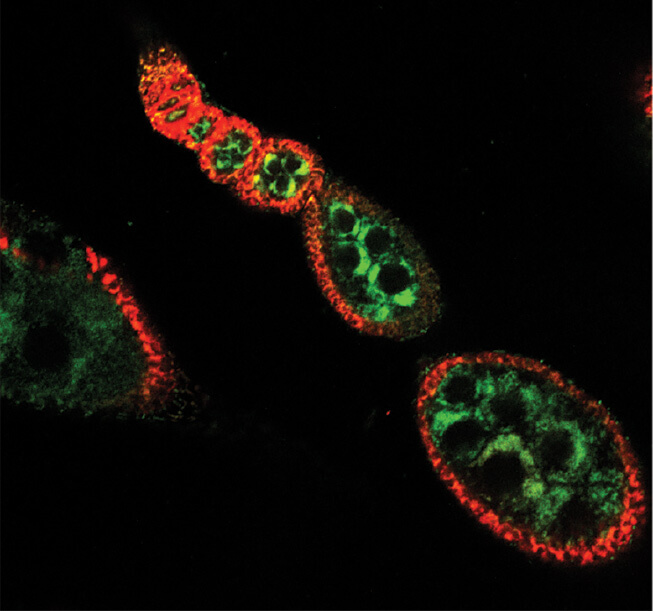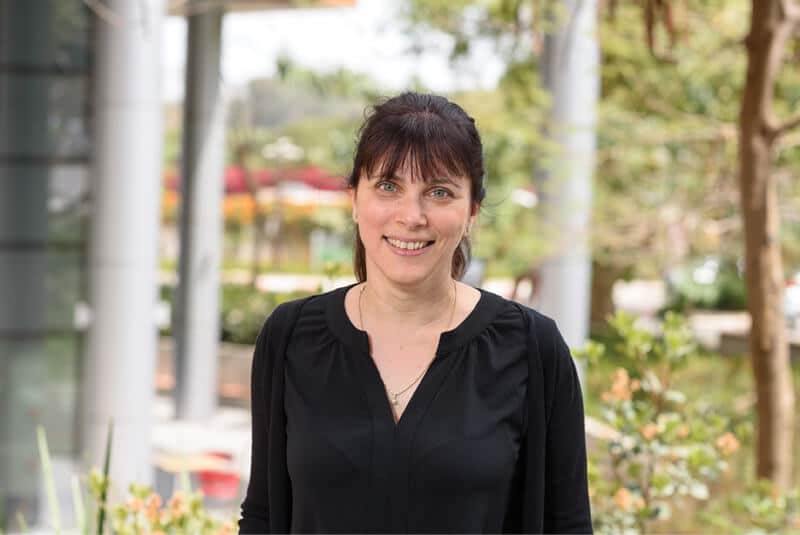The institute's scientists revealed an effect of the intestinal bacteria on the body's systems mediated by the supply of essential compounds for energy production in the mitochondria
In the last decade, we have witnessed a revolution in the study of the interrelationships between the gut bacteria and the host body, in the framework of which extensive effects of the bacteria on the body's development, health and function were revealed. However, despite the impressive progress in the field, the mechanisms by which the intestinal bacteria affect the various body systems remain obscure. In a recently published study, scientists at the Weizmann Institute for Science revealed a unifying mechanism based on a close relationship between the intestinal bacteria and energy production in the host body. The new findings also provide a mechanistic explanation for a well-known evolutionary phenomenon - a choice between personal survival and procreation.
A few years ago it was revealed in the laboratory of Prof. Yoav Soan From the Department of Biomolecular Sciences, a surprising connection between the intestinal bacteria and the production of eggs in the ovaries and subsequently also to the development of the offspring. In the current study - led by Dr. Yulia Gnainsky from Prof. Suan's laboratory and in collaboration with Dr. Sergey Malitsky and Dr. Maxim Itkin from the Department of Life Science Research Infrastructures - the researchers tried to understand how bacteria found in the intestine "remotely" affect the operation of the reproductive system in the ovaries. In a study conducted in the fruit fly model, a bacterial effect mechanism on the body's energy balance was revealed through the supply of essential metabolites for energy production in all body cells.

The center of energy production in the body's cells is found in the mitochondrion, sometimes called the powerhouse of the cell. It is a small organelle of which hundreds or thousands are found in most cells in the body. Mitochondria are the main producer of ATP - the main energy currency of all living things. The production of ATP in the mitochondria depends on the activity of coenzymes derived from vitamins, for example riboflavin (vitamin B2) which is a "raw material" for the essential coenzyme FAD. However, the fly, like man and other animals, is unable to produce group B vitamins by itself and needs an "external" supply - from a bacterial source or through nutrition. Metaphorically, the intestinal bacteria can be compared to producers of raw materials that are produced in the intestine and distributed to the entire body's systems - hence their systemic effect. The importance of the bacterial supply is expected to increase under conditions of nutritional deprivation, and the researchers hypothesized that even under fairly common nutritional conditions, the intestinal bacteria are significant suppliers of vitamins needed for mitochondrial activity. To test this they removed the gut bacteria in female flies. In addition to a decrease in egg production in the sterile flies, they also detected a FAD deficiency and accordingly - a delay in mitochondrial activity, a reduction in ATP production and a moderate decrease in body weight; A particularly strong inhibitory effect on mitochondrial activity was recorded in a specific group of ovarian cells enveloping the egg.
Bacterial effect on mitochondria
To test whether the inhibition of mitochondrial activity in ovarian cells leads in itself to a decrease in egg production, the researchers used genetic tools that inhibit the expression of mitochondrial proteins in selected cells, while avoiding the elimination of intestinal bacteria. It was found that the inhibition of the mitochondria in the cells of the oocyte envelope is sufficient to lower the rate of oocyte production; In fact, the effect of inhibiting mitochondria in these cells resembled the effect of eliminating the bacteria. It was also found that supplying intestinal bacteria, or alternatively vitamin B2, to females that developed without bacteria, increases mitochondrial activity in these cells and increases the rate of egg production, as well as ATP levels in the body. Further strengthening of the causal link between the intestinal bacteria and the production of energy in the host's body was obtained from experiments that revealed a positive effect of the intestinal bacteria on the ATP supply in males as well.
"In an attempt to understand how intestinal bacteria 'remotely' influence the operation of the reproductive system in the ovaries, we uncovered a fundamental mechanism of bacterial control over the activity of the mitochondria in the body's cells," says Prof. Suan. "As has been demonstrated many times in the past, the relative simplicity of the fly model is effective in revealing fundamental processes that exist in all living things, including humans. If we add to this the fact that in fact there is no other 'patent' - that is, the processes of energy production are evolutionarily preserved - we can expect that the fundamental findings discovered in the fly model are held in a similar way in many animals."

The research findings also offer a mechanistic explanation for the choice between allocating energy for survival and investing energy in raising offspring. In order to survive under stressful conditions, energy must be invested in dealing with the stress factor - and this investment detracts from the total energy and the many resources required for reproduction. The relationship revealed in the study between a lack of B vitamins (and the coenzymes derived from them) and a decrease in mitochondrial activity in the ovary, forms the basis for a regulatory mechanism that tends to prioritize energy investment in survival activities over investment in the next generation. "Although the relationship has so far only been demonstrated in the absence of bacteria and in relation to vitamin B2 only, this type of regulation is expected to exist in a wide range of nutritional situations," says Dr. Gnainsky.
The picture that emerges from the research is that the symbiosis between the bacteria and the host body rests on a central axis - a bacterial effect on the mitochondria. If we add to this the fact that the mitochondrion is an organelle with its own genetic load and is considered an evolutionary remnant of ancient bacteria, we get a semblance of cooperation between the intestinal bacteria and their "ancestors" - the mitochondria.
More of the topic in Hayadan:
- The efficiency of producing energy from food in the body depends not only on the type of food, but also on the time of eating
- The bee's brain pays a price to allow accelerated development of the ovaries
- DNA transferred between two fertilized eggs: a breakthrough and hope for the prevention of mitochondrial diseases
- Research in chickens has provided direct evidence of "paternal leakage" in which mitochondria are inherited from the father instead of the mother
